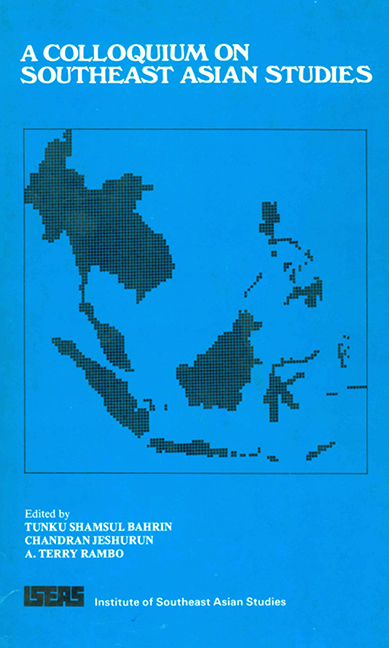Book contents
- Frontmatter
- Contents
- Foreword
- Preface
- Acknowledgements
- Introduction
- Contributors
- PART I TEACHING AND RESEARCH
- THE CONCEPTUAL THEORIES
- THE EXTRAREGIONAL EXPERIENCE
- THE REGIONAL PERSPECTIVE
- 8 Southeast Asian Studies in Indonesia
- 9 Southeast Asian Studies in Malaysia
- 10 Southeast Asian Studies in the Philippines
- 11 Southeast Asian Studies in Singapore
- 12 Southeast Asian Studies in Thailand
- THE PROBLEMS OF TEACHING AND RESEARCH
- PART II ENVIRONMENT AND DEVELOPMENT
12 - Southeast Asian Studies in Thailand
from THE REGIONAL PERSPECTIVE
Published online by Cambridge University Press: 21 October 2015
- Frontmatter
- Contents
- Foreword
- Preface
- Acknowledgements
- Introduction
- Contributors
- PART I TEACHING AND RESEARCH
- THE CONCEPTUAL THEORIES
- THE EXTRAREGIONAL EXPERIENCE
- THE REGIONAL PERSPECTIVE
- 8 Southeast Asian Studies in Indonesia
- 9 Southeast Asian Studies in Malaysia
- 10 Southeast Asian Studies in the Philippines
- 11 Southeast Asian Studies in Singapore
- 12 Southeast Asian Studies in Thailand
- THE PROBLEMS OF TEACHING AND RESEARCH
- PART II ENVIRONMENT AND DEVELOPMENT
Summary
Higher institutions of learning in Thailand at present (1977) number ten state universities, three national institutes (agriculture, technology and development administration), and ten private colleges (business and vocational). Of these institutions information on Southeast Asian Studies was primarily sought from the ten universities where it is recognized that interest in such studies exists.
All such institutions have a very high input of subjects concerning Thai matters, which outside the Thai setting would be considered as constituting a part of Southeast Asian Studies. In this report, however, Thai subjects are taken for granted, and inquiry is focused on the availability of subjects on other countries of the Southeast Asian region as a qualification for Southeast Asian Studies.
By Southeast Asian Studies one expects in its complete form a comprehensive programme of courses dealing with several aspects of society and culture of as many countries of the region as practicable — geography, history, economics, politics, sociology, anthropology, arts, religion, philosophy, etc., of the area covering as far as Burma to the west, Vietnam to the north, the Philippines to the east and Indonesia to the south. In an incomplete form some individual subjects dealing with some aspects of some countries of the region other than the host country would be counted as part of Southeast Asian Studies. A truly complete programme would also involve research as well as teaching on those subjects, preferably with fieldwork conducted in the specific countries of the topics investigated with adequate study in the vernacular. A less complete programme would rely on standard texts or at best limited library research for teaching and may or may not offer language courses.
By this definition it is anticipated that faculties and departments devoted to scientific and technological disciplines will not offer courses on Southeast Asian Studies as the latter would be largely in the nature of the social sciences and humanities.
- Type
- Chapter
- Information
- A Colloquium on Southeast Asian Studies , pp. 134 - 144Publisher: ISEAS–Yusof Ishak InstitutePrint publication year: 1981

